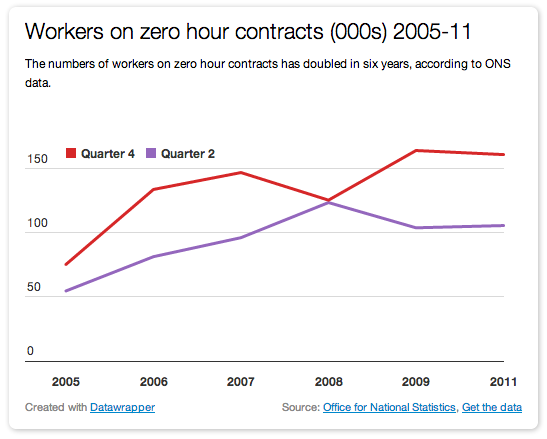Four of the UK’s top universities are among those employing the most lecturers on zero hour contracts leading to insecure and uncertain work.
Research from University and Colleges Union (UCU) shows Bath, Edinburgh, Lancaster and Glasgow universities together employ 5,500 teachers, researchers or academic services staff with no guarantee of work.
When contacted some universities were quick to qualify their use:
- Lancaster University said the contracts were only for students.
- At Cambridge where they have 83 staff on zero hours, a spokesperson said in a statement they were only used in very specific situations:
“Typically, such contracts are used for seasonal work, and are advantageous to employees who are taking a second job that they need to fit around other commitments, or students wishing to do some flexible working alongside their studies.”
Fourteen of the top twenty universities in the Complete University Guide for 2014 are using zero hour contracts. Only London School of Economics (LSE), Exeter, York, Leicester, University of Birmingham and King’s College London do not. An LSE spokesman said:
“LSE has not and does not employ any staff on formal zero hours contracts of employment.”
Locations of the twenty Higher Education institutions with the most zero hour contracts.
More than 1 in 8 of those employed in higher education survive on zero hour contracts, the University and College Union (UCU) survey shows.
Of those in teaching or research it is almost 1 in 6.
The data shows that of 141 HE institutions, more than half use zero hour contracts.
Back in May, on learning about the spread and impact for its members, UCU began making Freedom of Information requests to find out how widely the contracts were used. 87% of institutions responded.
The survey defines zero hour contracts in use in Higher Education (HE) as an arrangement where the employer has no obligation to offer work or guarantee a minimum number of hours.
After seven years in higher education, for example, a PhD student on a zero hour contract would have no security of income. Visiting lecturer Carrie Dunn wrote about the high workload and the insecurity this brings.
Some say the unpredictability of research grants and lecturers on sabbaticals demands flexibility but those facing sudden drops in hours may have been unaware of their terms when they radically altered without warning. As an alternative, centres have offered short term or minimum hour contracts.
Since the UCU survey, Edinburgh University has agreed to stop using zero hour contracts and signed an agreement with UCU after the survey revealed they were the worst employers having the highest number on zero hours at 2712.
Related reports:
